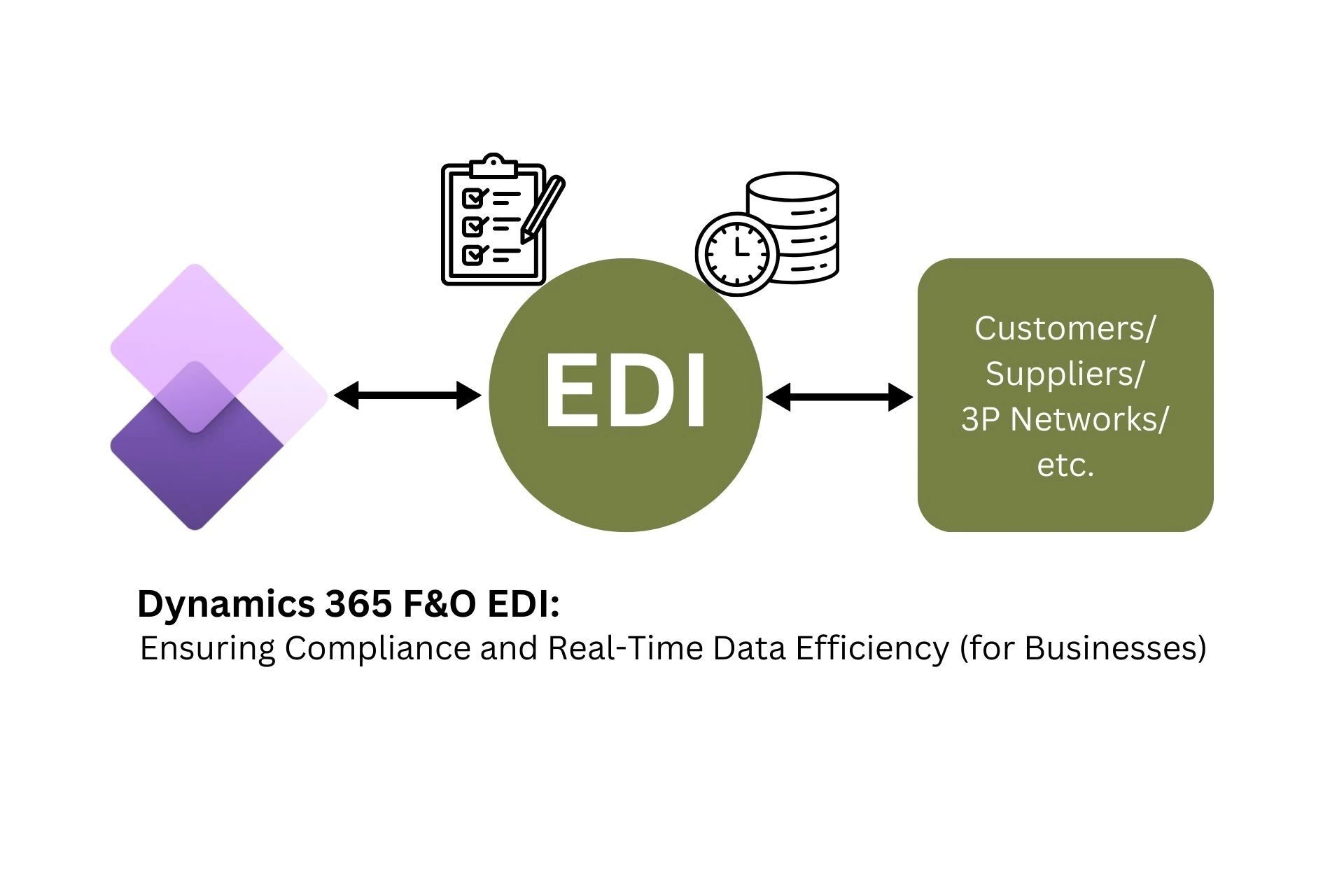In the fast-paced world of industrial manufacturing, unplanned downtime costs businesses a staggering $50 billion annually. For organizations striving to stay competitive, minimizing disruptions and enhancing efficiency is no longer a choice – it’s a necessity.
One of the most effective ways to tackle these challenges is through Electronic Data Interchange (EDI). When integrated with Microsoft Dynamics 365 Finance & Operations (F&O), EDI transforms how businesses handle transactions, optimize supply chains, and communicate with trading partners.
This blog delves into the powerful combination of EDI and Dynamics 365 F&O, highlighting how it enables operational excellence and fuels business growth.
Operational Excellence:
1. Automation and Unified Communication for Streamlined Operations
“Automation is no longer a choice but a competitive necessity.”
– Forrester Research
EDI integration with Dynamics 365 F&O automates business document exchanges like invoices, purchase orders, and shipping notifications, eliminating manual processes that are time-consuming and error-prone.
Automated Workflows:
Once a document is generated, it is formatted into EDI-compliant data and sent directly to the intended trading partner.
For instance, a purchase order created in Dynamics 365 F&O can be automatically shared with a supplier, streamlining the procurement process.
Unified Communication Channels:
By standardizing communication formats (like ANSI X12 or EDIFACT), EDI ensures smooth data transmission across different systems, enabling efficient interaction between trading partners.
Example:
A manufacturing company receives real-time shipping updates from its suppliers, reducing delays in the production cycle caused by miscommunication.
Key Benefits:
- Faster document exchange: Purchase orders, invoices, and shipment notifications are processed instantly.
- Reduced manual intervention: Eliminate the risk of human error and save valuable time.
- Improved partner relationships: Accurate and timely communication strengthens trust with suppliers and customers.
2. Real-Time Data Exchange

A study by Oxford Economics revealed that 49% of top supply chain leaders can capture and act on real-time data insights immediately, enabling swift reactions to changing conditions.
In today’s dynamic business environment, having access to accurate and timely data is critical for making informed decisions.
Immediate Document Processing:
EDI enables real-time transfer of critical business data, such as inventory levels or order statuses, directly into Dynamics 365 F&O.
This continuous, bidirectional communication, where both parties in a transaction can send and receive data simultaneously.
This real-time exchange strengthens collaboration between buyers and suppliers, ensuring that both parties are aligned on transaction details, order status, and financial information.
Example:
Retailers can avoid stockouts during peak seasons as their inventory data is synced in real-time with suppliers, who can replenish stock promptly.
Key Benefits:
- Enhanced decision-making: Managers can act on the latest data, avoiding delays caused by outdated information.
- Proactive problem-solving: Identify and resolve bottlenecks before they escalate.
- Inventory optimization: Prevent overstocking or stockouts with real-time inventory visibility.
3. Regulatory Compliance
Regulatory compliance is one of the most critical aspects of any business, especially when dealing with financial transactions, inventory management, and cross-border trading.
EDI with Microsoft Dynamics 365 F&O ensures that all transactions adhere to international standards and government regulations, a critical requirement in industries like healthcare, finance, and manufacturing.
Further, in the case of cross-border trade, EDI facilitates the exchange of customs documents that adhere to import/export regulations, allowing businesses to avoid fines and delays.
Compliance Standards:
EDI formats like EDIFACT and ANSI X12 meet the regulatory requirements of different regions. Dynamics 365 F&O, integrated with EDI, automatically validates document compliance before transmission.
Example:
A European food distributor using Dynamics 365 F&O integrated with EDI ensures its invoices align with local e-invoicing mandates like PEPPOL.
In another example, when dealing with VAT submissions in Europe or E-invoicing requirements in countries like Italy or Spain, EDI helps ensure that invoices are compliant with tax regulations.
Key Benefits:
- EDI systems provide an audit trail for all transactions, helping businesses stay compliant and ready for inspections.
- EDI messages exchanged between partners are encrypted, ensuring that sensitive information is protected during transmission.
- Any issues related to non-compliance can be flagged immediately, enabling businesses to take corrective action before any penalties or fines are imposed.
- The system can also track who accessed specific data, ensuring that businesses can report on data handling practices when required by regulators.
For a detailed guide on how Dynamics 365 F&O and EDI work together to enhance compliance and enable real-time data efficiency, check out our blog: Dynamics 365 F&O EDI: Ensuring Compliance and Real-Time Data Efficiency.
4. Enhanced Data Accuracy

According to Gartner, every year, poor data quality costs organizations an average of $12.9 million.
Manual data entry is prone to errors, leading to costly disruptions in operations.
EDI integration with dynamics 365 F&O eliminates manual processes, ensuring all data exchanged between systems is accurate and consistent.
Automated Validation:
Documents are validated against predefined rules before they’re exchanged, ensuring accuracy. For instance, incorrect order quantities or invalid product codes are flagged immediately.
Centralized Data Management:
Dynamics 365 F&O acts as a single source of truth, storing accurate data received via EDI for various departments to access.
Example:
A logistics company processes shipping instructions without errors, reducing the chances of delivering incorrect orders.
Key Benefits:
- Prevents errors in invoices, purchase orders, and shipment details.
- Reduces rework and associated costs.
- Builds trust with trading partners through error-free communication.
5. Improved Supply Chain Efficiency
Increased cost of working is the leading consequence of supply chain disruptions, at 84.6%, as per Fictiv.
Supply chain disruptions can have a domino effect on operations, impacting costs, customer satisfaction, and profitability.
EDI integration with Dynamics 365 F&O enhances supply chain efficiency by streamlining the flow of information between suppliers, manufacturers, and distributors.
End-to-End Visibility:
Businesses gain real-time insights into inventory levels, shipment statuses, and demand forecasts, enabling proactive decision-making.
Collaborative Planning:
EDI fosters better collaboration with trading partners, ensuring that orders, shipments, and inventory levels are aligned.
Example:
A retailer using EDI notices increased sales of a specific item and instantly communicates with its supplier to expedite replenishment, avoiding lost revenue due to stockouts.
Key Benefits:
- Real-time visibility into inventory levels and shipment status.
- Faster order processing, reducing lead times.
- Enhanced collaboration with suppliers and logistics partners.
6. Future Proofing

As businesses grow and markets evolve, scalability and adaptability are crucial.
Scalable Infrastructure:
As a business grows, EDI solutions can easily handle increased transaction volumes without additional overhead costs.
Support for Emerging Technologies:
Dynamics 365 F&O, paired with EDI, supports new data exchange formats and technologies like blockchain, ensuring businesses stay competitive.
Example:
A multinational company expands to new markets and quickly integrates with local suppliers using EDI, avoiding delays in setting up new processes.
Key Benefits:
- Manage large volumes of transactions without additional manual effort.
- Onboard new trading partners quickly through standardized EDI formats.
- Adapt to expanding supply chain operations with ease.
- Stay ahead of market trends and regulatory changes.
Business Growth
1. Significant Cost Savings

Cost optimization is a critical factor for achieving sustainable growth.
Implementing EDI integration with Dynamics 365 F&O significantly reduces costs associated with manual data entry, error correction, and paper-based transactions.
By automating document exchange, businesses eliminate inefficiencies in invoicing, purchase orders, shipping notices and other business documents.
Example:
For a company processing 10,000 invoices annually, switching to EDI can result in savings of over $150,000 each year due to reduced labor and material costs.
Key Benefits:
- Reduced administrative costs by automating routine tasks.
- Savings on paper, printing, and postage with digital document exchange.
- Lower rework costs by eliminating errors.
Impact on Growth:
These savings can be redirected to growth initiatives, such as R&D, market expansion, or customer acquisition strategies.
Discover how EDI integration with Dynamics 365 F&O enhances operational excellence by automating processes, ensuring compliance, and driving impactful business growth.
2. Building Better Relationships with Trading Partners
According to a study on EDI-enabled relationships published on ResearchGate, EDI-enabled business partnerships play a vital role in seamlessly connecting suppliers and customers, fostering collaboration and operational efficiency.
Strong partnerships are the cornerstone of long-term business success.
EDI strengthens relationships by providing a seamless, reliable, and transparent communication channel between businesses and their trading partners.
Example:
A distributor using Dynamics 365 F&O with EDI can meet the compliance and data requirements of global suppliers, fostering long-term collaborations.
Key Benefits:
- Accurate and timely exchange of documents such as invoices and purchase orders.
- Enhanced transparency and accountability.
- Fewer disputes due to error-free transactions.
Impact on Growth:
Better relationships translate to repeat business, preferential terms, and access to new markets through partner networks.
3. Faster ROI

On average, companies can expect to achieve a positive Return on Investment (ROI) within 12 to 18 months of implementing Electronic Data Interchange (EDI), thanks to the significant cost savings and efficiency improvements it offers (staedean).
Integrating EDI with Dynamics 365 F&O is a smart investment that delivers a quick return on investment (ROI).
The automation of manual processes and the elimination of inefficiencies drive cost savings and operational gains almost immediately.
Example:
A retail business integrating EDI with Dynamics 365 F&O experienced a 30% reduction in order-to-cash cycle time, accelerating their revenue generation.
Key Benefits:
- Reduced operational costs lead to faster breakeven points.
- Increased efficiency accelerates revenue generation.
- Real-time data insights enable quicker adjustments to market demands.
Impact on Growth:
Faster ROI enables businesses to reinvest profits into scaling operations, launching new products, or exploring new markets.
4. Faster Decision-Making
Access to accurate, real-time data is crucial for informed decision-making.
Automated workflows and centralized data eliminate the need for manual data reconciliation, ensuring leaders always have access to up-to-date information.
EDI integration with Dynamics 365 F&O ensures that all critical business information is available instantly, empowering leadership teams to make proactive and strategic decisions.
Example:
A logistics company reduced shipment planning time by 25% by leveraging real-time data from their EDI-enabled ERP system.
Key Benefits:
- Up-to-date inventory and order status allow for better resource planning.
- Real-time insights into customer and supplier activities enhance responsiveness.
- Faster identification of issues prevents costly delays.
Impact on Growth:
Faster decisions allow businesses to capitalize on market opportunities, respond swiftly to customer demands, and outpace competitors.
Conclusion:
EDI integration with Dynamics 365 F&O doesn’t just enhance operations—it drives measurable business growth. By reducing errors, cutting costs, ensuring scalability, strengthening relationships, delivering a quick ROI, and enabling faster decisions, EDI positions your business for success in an increasingly competitive landscape.
Whether you’re a manufacturer, retailer, or distributor, EDI integration with D365 F&O can drive efficiency and elevate your business to new heights. Want to see how EDI can revolutionize your business operations? Contact us now to get started!




